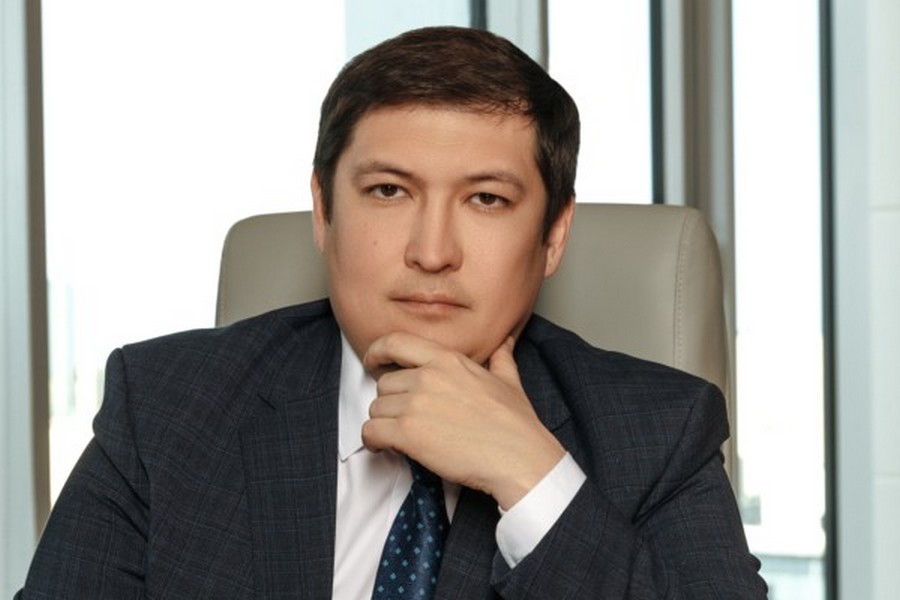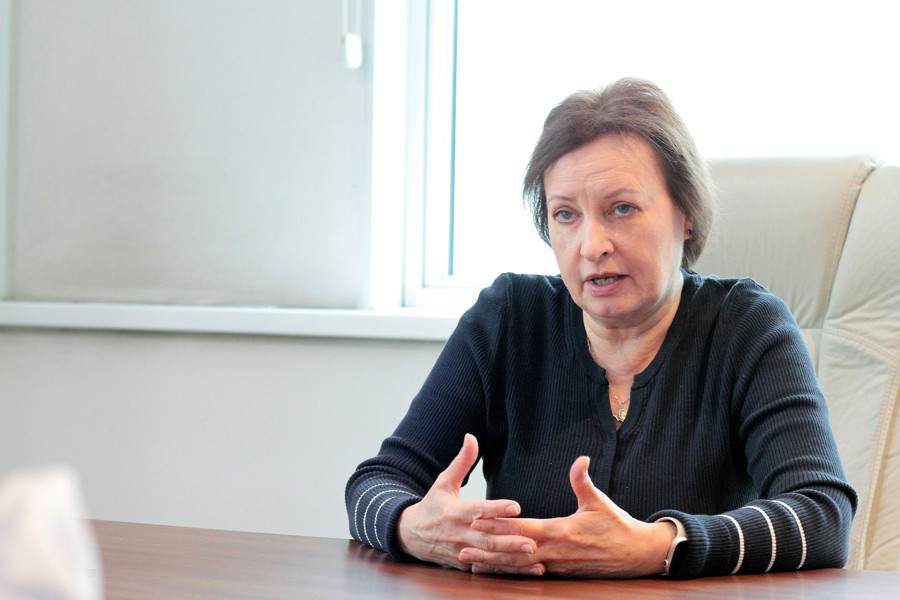Chairman of the Management Board of the Development Bank of Kazakhstan Abai SARKULOV:
DBK REGULARLY UPDATES ITS ANTI-CRISIS PLAN TO SUPPORT BORROWERS

The strategic objectives of Development Bank of Kazakhstan (DBK) are the development of manufacturing facilities and industrial infrastructure. The coronavirus pandemic made its adjustments to many projects. DBK CEO Abai SARKULOV talked about how the development institution supports its borrowers during the pandemic, about implemented and new projects in an interview with Interfax-Kazakhstan.
- Thank you for the opportunity to discuss the latest changes in the development institution aimed at adapting to new conditions, as well as upcoming plans of the bank. Abai Serikovich, it was reported earlier that DBK was restructuring loans to borrowers as part of an anti-crisis plan. How much is restructuring planned for?
- In light of the ongoing changes caused by the pandemic, which also affected some of our borrowers, DBK worked out an anti-crisis plan, which is regularly updated given ongoing changes in order to support borrowers and the financial stability of the bank.
For example, the plan includes activities such as the restructuring of borrowers’ foreign currency-denominated loans, which are carried out depending on the availability and receipt of appropriate concessional funding in the national currency.
The total amount required to continue work on converting debts of the bank's customers is about 114.2 billion tenge (399.47 tenge/$1), or 6% of the loan portfolio of the bank (1.911 trillion tenge).
In addition to converting foreign currency debts, the bank also provides deferrals on repayments of principal debts and interest for borrowers and cancels penalties for the for late execution of financial and non-financial obligations.
- Your subsidiary DBK-Leasing provided the opportunity to purchase domestic agricultural equipment without a down payment for farmers. What other anti-crisis measures will be implemented through DBK-Leasing?
- Currently on a case-by-case basis JSC DBK-Leasing considers issues of providing a deferral on leasing repayments in accordance with requests of lessees. Also, by decision of the Management Board of JSC DBK-Leasing it is decided not to levy penalties from March 15, 2020 to May 31, 2020 for non-fulfillment and (or) improper execution of financial and (or) non-financial obligations by counterparties to JSC DBK-Leasing in accordance with the terms and conditions of concluded deals.
- What large projects are planned for implementation in the green economy? Talk through the most significant of them.
- Kazakhstan is now in the trend of global demand for renewable energy sources. 90 power plants currently launched in Kazakhstan with the participation of both domestic and foreign investors showcase this. There are projects with the participation of DBK among these projects, for example: to date, two solar energy projects and one wind farm have been financed and put into operation, these are: the Zhylga photovoltaic power plant in Turkestan region with a capacity of 20 MW, EcoProTech-Astana LLP; finances from the bank amounted to 9 billion tenge, as well as the 100 MW solar power plant in the town of Kapshagai in Almaty region, the borrower of which is ENEVERSE KUNKUAT LLP; the bank provided 10.8 billion tenge in financing.
Both projects were financed through the financing method within the framework of the Law on Project Financing and Securitization of the Republic of Kazakhstan. And I would also like to note that the international companies Universal Energy in the person of its project company Eneverse Kunkuat take part in the implementation of these two projects, and the German company DERA GmbH acts as an investor in the Zhylga project. The availbility of these projects in DBK's portfolio is a positive signal for foreign investors in the green energy sector; the bank can become an experienced and reliable partner for them.
In addition, the Astana EXPO-2017 100 MW wind farm in Akmola region, the borrower is Central-Asian Power Energy Company Green Energy LLP. Initially, the bank provided 30.5 billion tenge in financing for the construction of the 1st start-up unit, which was already been commissioned last year, later 9.8 billion tenge in additional funding for the 2nd start-up unit of the wind farm was approved.This project uses best turbines ever made by the world's largest manufacturer, the leader in this industry - Westas company (Denmark).
The bank also approved financing for the project Construction of Small Hydroelectric Power Plants in Almaty region, the borrower of which is Baskan Power LLP. The project cost is 10.4 billion tenge, the amount to be funded by the bank is 7 billion tenge.
If one talks about projects under consideration, then in the green energy field at the moment there are a number of both potential solar energy projects and projects on the construction of bioelectric power plants in the bank's pipeline.
It should be noted that the bank began to review renewable energy projects in 2015, almost immediately after the government first set long-term fixed tariffs, introduced the centralized purchase of electricity from various renewable energy facilities, and after the initiators received the first PPAs.
With the development of renewable energy in Kazakhstan, the bank has been expanding its competence in conjunction with its clients. We studied legislation, began to understand the specifics of this or that plant, technical nuances depending on the source of generation, location, equipment being used and we compared with international experiences.
- Will car loans continue for Kazakhstani citizens to purchase domestic cars? How much money has been allocated for this program this year?
- The soft car lending program is in great demand among Kazakhstani residents. The bank has already allocated 6 tranches totaling 82 billion tenge. In addition, in accordance with a decree of the Management Board of the National Bank of Kazakhstan it is planned to allocate funds under totaling 60 billion tenge this program within the next three years (until 2023) with 20 billion [breakdowns] tenge annually. Lending under the program is revolving: repayments on existing loans are redirected towards issuing new loans. Thanks to such fund re- disbursement Kazakhstani residents purchased 20,629 domestically assembled cars totaling 98,219 million tenge on preferential terms.
- How many funds does DBK plan to direct this year towards financing export transactions? Is it planned to revise the minimum 1 billion tenge loan amount or the financing rate?
- As part of the allocated funds (65 billion tenge are funds of the Kazakh National Fund and 30 billion tenge are funds raised by DBK at the market interest rate) for export financing, DBK annually finances export transactions worth at least 95 billion tenge, this is to be implemented this year as well.
A decrease in the minimum loan amount within the framework of export transactions will entail DBK's competition with financial tools of second-tier banks, which cannot be considered to be fair competition given that DBK acts as the operator of state programs. In addition, the Baiterek system has subsidiaries such as JSC ESK KazakhExport and JSC Damu Entrepreneurship Development Fund, whose activities are also relating to the support of domestic non-resourse commodity exports by placing conditionally cheap funds with second-tier banks and subsidizing interest rates. As you understand, as a result of the minimum loan amount reduction overlapping is possible in terms of providing for state financial support in favor of the same entities in this area.
As for the possible interest rate reduction in order to support domestic exports then the rate is formed on the basis of mixing cash received from government sources and funds raised from the market. In the event of a decrease in the value of the latter, of course DBK will go for a reduction in the interest rate to support domestic exports.
- It was reported earlier that the bank will direct up to 430.9 billion tenge towards developing manufacturing facilities. What projects are to be commissioned in the manufacturing sector?
- The bank continues to maintain a positive trend in the dynamics of lending to manufacturing and industrial infrastructure projects. In 2019, DBK's loan portfolio reached 1.729 billion tenge, an increase of 32.9 billion tenge or up 1.9% compared to 2018. In 2019, eight projects were implemented that created 1,763 new jobs. These are capital intensive projects with a multiplier effect on the sectors of the Kazakh economy such as the high-tech ferrosilicon plant in the [city of] Karaganda, the Saryarka gas pipeline, the deep processing facility at the Atyrau oil refinery, the Nurgisa solar power plant in the [town of] Kapchagai, and the Zhylga solar power plant in Turkestan region, the first phase of the Astana EXPO-2017 wind farm in Akmola region and other projects.
As for 2020, of course, the coronavirus infection pandemic made adjustments to plans on completing the projects investment phases. But, despite the state of emergency and closed borders, our borrowers managed to find a solution and actively continue construction work. Now the work is underway on 14 construction sites, where 6,278 people are involved, and of course, all types of protection against coronavirus are used. If one talks about sectors of the economy, these are manufacturing and infrastructure projects as part of the state program of accelerated industrial and innovative development, the Nurly Zhol [program] export transactions, support for domestic car makers.
This year it is planned to commission production facilities under the projects such as the construction of the second phase of the broiler poultry farm in the Bulandinsky district of Akmola region, the development of the oil machine building plant , the second start-up unit of the 50 MW Astana EXPO-2017 wind farm and others.
- In 2019, DBK increased its net profit 240% to 10.9 billion tenge. What is the profit forecast like for 2020? Is it revised downward in the current economic conditions?
- The planned net profit value for 2019 stood at 4 billion tenge, while the bank made a profit of 10.9 billion tenge last year due to the loan portfolio improved quality and effective liquidity management. However, I would like to emphasize that the bank is a development institution and one of the main strategic roles of the bank is to finance long-term large-scale projects in the field of industry and industrial infrastructure with a high degree of risk. DBK does not set itself a task of maximizing profit, while one of our tasks is to ensure the bank’s breakeven activity.
As part of the approved development plan of the bank, the net profit planned value for 2020 is about +4.6 billion tenge. However, it is worth taking into consideration that given the current factors (the credit risk increase among the bank’s borrowers as a result of the spread of coronavirus and the weakening national currency), the value of the forecast indicators of the bank’s development plan for 2020, including the net profit indicator, can be revised by the bank. At the same time, it is too early to talk about concrete values, since the economic impact of the global pandemic on the bank’s borrowers and financial performance as a whole can be tentatively estimated only based on the results of the first half of 2020.
- Thank you for the interview!
June, 2020
© 2026 Interfax-Kazakhstan news agency
Copying and use of these materials without reference to the source is prohibited
Archive





